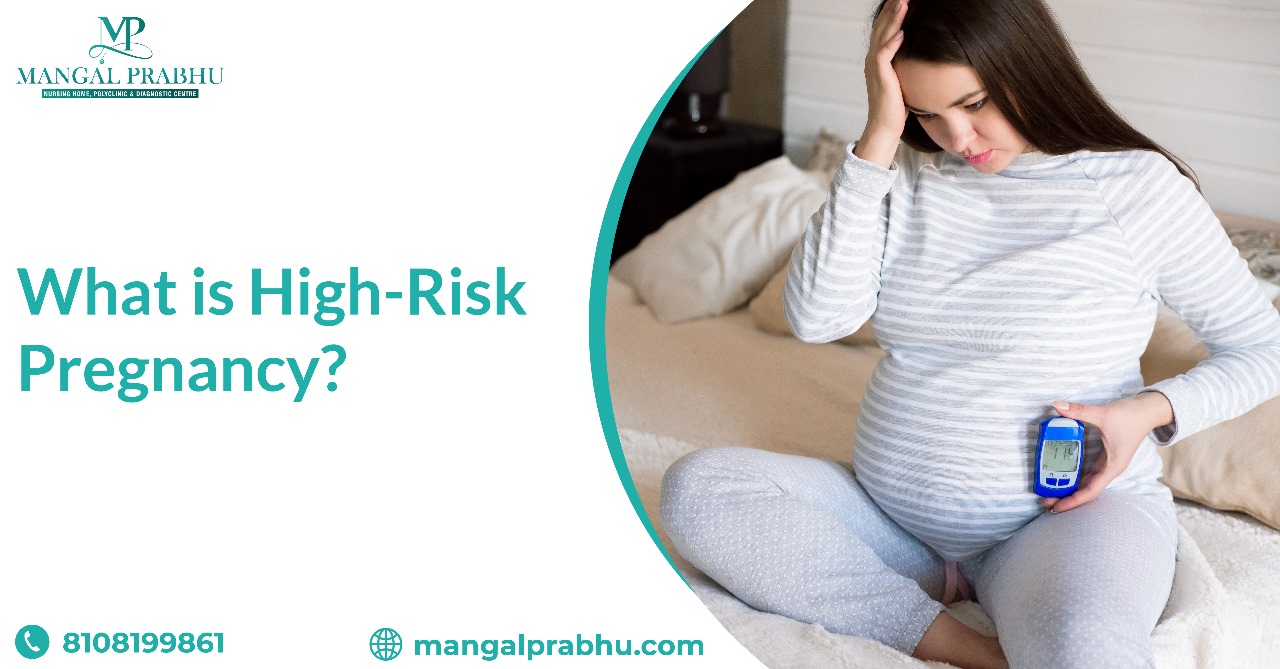
What is a High-Risk Pregnancy?
During pregnancy, both mother and fetus require regular monitoring and care to avoid possible risk or fatal. A high-risk pregnancy is a critical issue that can increase the risk of her and her baby’s death. Mangal Prabhu has the best Gynecologist and Obstetrician in Navi Mumbai who can help an expecting woman avoid high-risk pregnancy and help better the growth of their children.
Definition of High-Risk Pregnancy
High-risk pregnancy is one of the most well-known health issues occurring due to various factors. It is a pregnancy that carries a higher degree of complication to a mother or fetus. However, high-risk pregnancy does not always mean that the mother and fetus will have issues during pregnancy, labor, and delivery, but they may require some special health needs.
Causes of High-Risk Pregnancy
Some of the most common causes which can lead to high-risk pregnancy are:
1. Maternal Age
Women who are usually under 17 years of age or more than 35 years of age have a higher risk of complications during pregnancy. Age can lead to various issues, such as chromosomal abnormalities and conditions related to pregnancy.
2. Pre-Existing Medical Conditions
Some women with diabetes, heart disease, hypertension, autoimmune issues, infectious disease, etc, have a higher risk of suffering from high-risk pregnancy. These conditions have a potential impact on the mother and baby and can cause severe complications.
3. Multiple Gestation
Twin or multiple pregnancies usually have a higher risk as they are more complex pregnancies with increasing risk of complications.
Also Read: What Is The Most Common Cause Of Premature Birth?
Complications of High-Risk Pregnancies
People with pre-existing issues and deviant lifestyles have an increased health risk during pregnancy. However, some of the possible complications are:
a) Preterm Labor
Sometimes, high-risk pregnancy can lead to preterm labor, which can sometimes cause premature birth and other health issues to the fetus.
b) Gestational Diabetes
High-risk pregnancies sometimes develop gestational diabetes, which can lead to increased sugar levels and cause risk to both mother and baby.
c) High Blood Pressure
High blood pressure or hypertension can lead to severe risk or be fatal to both mother and baby if not treated well.
Management of High-Risk Pregnancies
Management of high-risk pregnancies is essential to avoid undesirable complications. However, the best pregnancy care hospital in Navi Mumbai follows the given management plan for better treatment of issues:
i) Nutrition
A mother should follow better nutrition and diet, according to dietitians, to support mother and baby and manage high-risk pregnancies.
ii) Exercise
Pregnant women must do exercises depending on their issues to promote overall well-being during high-risk pregnancies. However, before exercising, an individual must consult with a doctor and dome under certain precautions.
iii) Stress Management
Stress can lead to a higher -risk of pregnancy complications. However, it would be best to adopt stress reduction methods like meditation and relaxation exercises to manage it.
Conclusion
High-risk pregnancies can lead to severe complications and preterm delivery. Thus, it would be best to adopt proper monitoring, management approaches, treatment, and specialized care to avoid potential complications associated with pregnancies. However, Mangal Prabhu Hospital has the best management and treatment to prevent pregnancy complications.
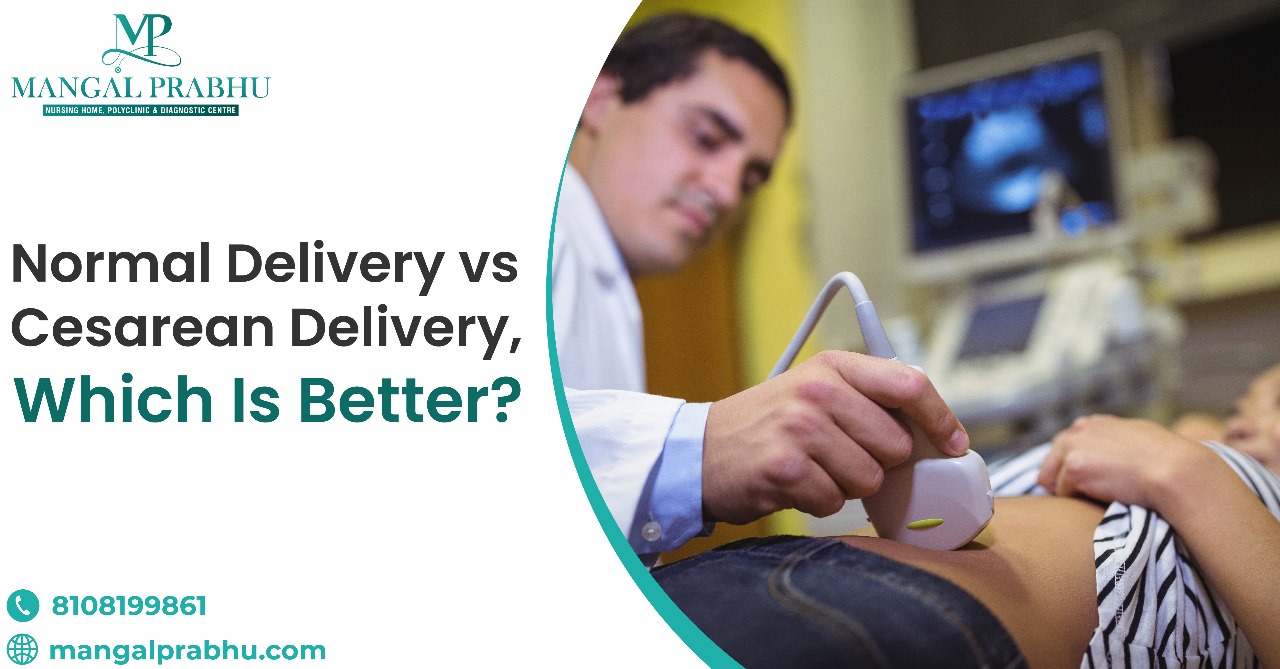
Normal Delivery Vs Cesarean Delivery, Which Is Better?
Childbirth is a life-altering experience for women. Regarding childbirth, doctors perform two primary methods: normal and cesarean. Both have advantages and disadvantages, and their choice often depends on various factors. In this article, with the guidance of a trusted Obstetrician in Navi Mumbai at Mangal Prabhu Hospital, you can learn the difference between these delivery procedures. You can also define and explore normal and cesarean deliveries’ benefits and health risks.
Definition of Normal Delivery vs. Cesarean Delivery
Normal Delivery
Normal delivery is also known as vaginal birth. It is the most natural way of bringing a baby into the world. It involves the baby passing through the birth canal, typically headfirst. Normal delivery can occur without medical interventions, but pain relief methods or assistance may sometimes be used.
Cesarean Delivery
It is often called a C-section. It is a surgical procedure where the baby is delivered through an incision in the mother’s abdomen and uterus. Doctors typically use it when complications or risks are associated with a vaginal birth.
Benefits of Normal Delivery:
- Mothers who deliver vaginally recover quicker than those who undergo C-sections. They can often resume their regular activities sooner.
- Since no abdominal surgery is involved, the infection risk is lower with normal delivery.
- Vaginal births often facilitate immediate skin-to-skin contact and bonding with the baby, making breastfeeding initiation easier.
Benefits of Cesarean Delivery:
- Cesarean deliveries are typically scheduled or planned, providing a controlled environment for the birth, which can be beneficial in certain medical situations.
- C-sections can reduce the risk of birth injuries, especially when the baby is in an abnormal position or size.
- Some women may prefer C-sections to avoid the potential pain and trauma associated with vaginal delivery.
Also Read: What Are The Side Effects Of A C-section Delivery?
Health Risks Associated with Normal Delivery:
- Vaginal births can result in perineal tears, which may require stitches and lead to discomfort during recovery.
- There is a risk of pelvic organ prolapse, where the pelvic organs shift from their normal position, causing discomfort and requiring further medical attention.
- Some women may experience urinary or fecal incontinence due to the strain placed on the pelvic floor during vaginal birth.
Health Risks Associated with Cesarean Delivery:
- C-sections involve surgery, which comes with inherent risks such as infection, bleeding, and anesthesia-related complications.
- Mothers who undergo C-sections have a more extended recovery period and may experience pain and discomfort at the incision site.
- Immediate skin-to-skin contact and bonding with the baby can be delayed in C-sections due to the surgical procedure.
Conclusion
Both normal and cesarean delivery have advantages and disadvantages. Their choice should be based on individual circumstances, including medical conditions, risks, and the mother’s and healthcare provider’s preferences. Expectant mothers must have open and thorough discussions with their obstetricians, such as those at Mangal Prabhu Hospital, a trusted maternity/pregnancy hospital in Navi Mumbai, to make the most informed decision.
Ultimately, there is no one-size-fits-all answer to whether normal or cesarean delivery is better. The well-being of both the mother and the baby should be the primary consideration, and the chosen delivery method should align with their unique needs and circumstances.
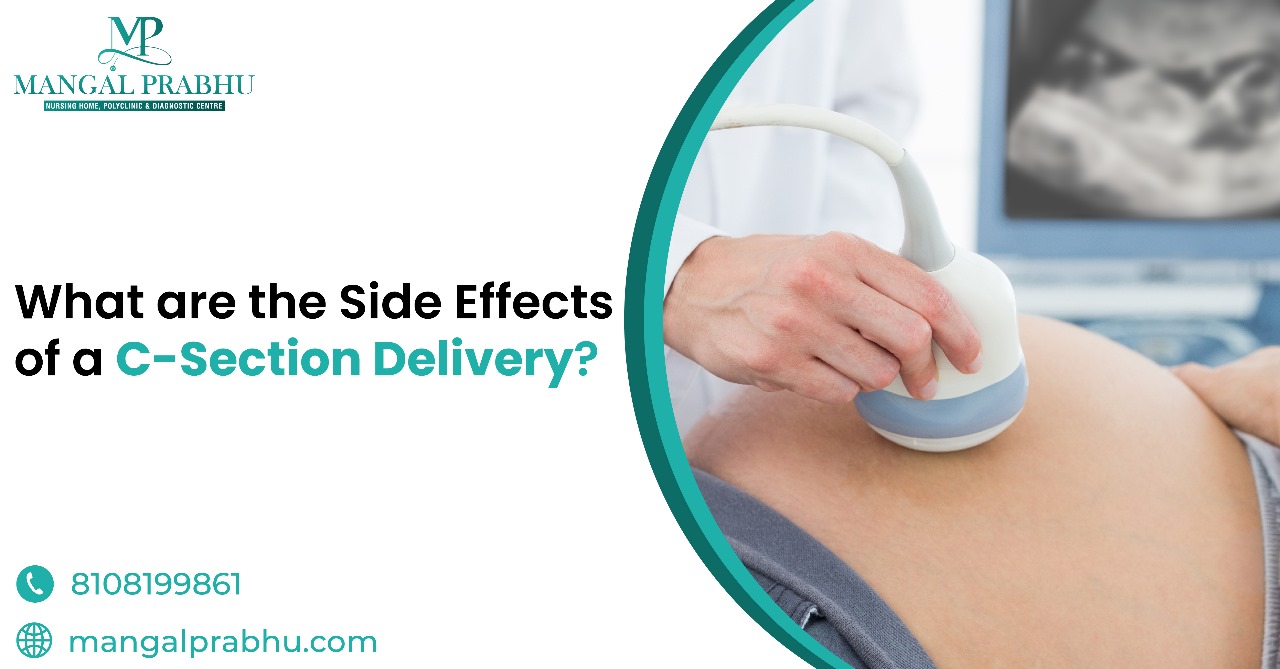
What Are The Side Effects Of A C-section Delivery?
C-section or Cesarean delivery is the birth of a baby through a surgical incision on the mother’s abdomen instead of delivering it through the vagina. You must need to visit a professional surgeon at a cesarean delivery hospital in Navi Mumbai to determine whether or not you are an ideal candidate for a vaginal delivery.
You might need a c-section if your baby’s heartbeat seems to be getting abnormal, your labor isn’t progressing, you have twins, a blockage in the birth canal, a prolapsed umbilical cord, etc. Women who had their first child delivered through C-section might be advised to have their future deliveries through an abdominal incision.
Short-Term Side Effects
Like any surgery, a C-section comes with its share of risks, including pain and discomfort for a few days following the surgery. It also leads to the risk of infection around the incision site. Infections occur when the bacteria spread inside the uterus.
If you notice unusual swelling, redness, and bleeding at the site of incision and excessive pain that won’t go away on its own, visit the pregnancy care hospital in Navi Mumbai to rule out the possibility of infection. High fever, fatigue, and a foul-smelling discharge are also common signs of bacterial infection.
Also Read: Understanding Vaginal Birth After Cesarean (VBAC)
Long-Term Side Effects
There can be long-term side-effects of c-section, such as blood clot formation in your veins or a surgical injury that can damage your bladder or bowel. Let’s check out a few common adverse effects of the C-section.
1. Reaction to Anesthesia:
Depending on the type of anesthesia given, you might experience a sore throat, nausea, vomiting, fever, and other complications.
2. Injury from the Surgery:
It’s a rare complication of a C-section delivery but is possible. A surgical injury can occur to the bladder, bowel, and other surrounding organs. It can also cause injury to the baby.
3. Complicated Future Pregnancies:
C-section increases the risk of complications in future pregnancies. Although it’s possible to deliver a child normally after one c-section, most doctors recommend c-sections for future deliveries. Frequent cesarean deliveries can also cause placenta accreta, placenta previa, and other such complications.
What Does Recovery from C-section Look Like?
Recovery might take anywhere between 4 and 6 weeks after the surgery, and longer depending on the complications in your pregnancy. You will be advised to avoid strenuous activities, heavy lifting, and physical exercises for the first few weeks.
You might experience slight cramping and bleeding from the incision site, but all these side effects are temporary and will eventually fade once you have recovered fully. You will be given painkillers for the first few days. You must refrain from having intercourse for a few weeks or until your surgeon gives you the green light.
Conclusion
If there are any complications in your pregnancy or there’s a risk to the baby or the mother’s health, the doctor might recommend an emergency c-section. This can produce the above-listed symptoms, although not everyone experiences complications. Ask your surgeon for more information about full recovery and post-partum care.

Understanding Vaginal Birth After Cesarean (VBAC)
Women who have had a cesarean section, often wonder if they can have a vaginal birth next time. The good news is that you can opt for vaginal birth. Studies show that VBAC has a success rate. Here, you can learn the vaginal birth after cesarean. You can talk with a gynecologist in Navi Mumbai to decide if VBAC is right for you.
Definition of Vaginal Birth After Cesarean (VBAC)
Vaginal Birth After Cesarean is commonly known as VBAC. This procedure refers to the delivery of a baby through the vagina by a woman who has previously undergone a cesarean section for a previous birth. It allows women with a prior C-section to experience a vaginal birth for subsequent pregnancies. You can visit Mangal Prabhu Hospital if you want this medical procedure. They are known for their skilled medical professionals and complete care.
Benefits and Risks of VBAC
VBAC presents several potential benefits for women. It allows them to avoid the risks associated with repeat C-sections, such as infection, blood loss, and more. Vaginal birth also facilitates a quicker recovery and a lower risk of future surgical complications. Additionally, it promotes a sense of empowerment and satisfaction for women who desire a more natural birth experience.
However, this procedure also carries certain risks. The most significant concern is uterine rupture, which occurs when the scar from the previous C-section opens during labor. Although the risk is relatively low, it can be life-threatening for both the mother and the baby.
Factors That Affect VBAC Success
Several factors influence the success of a VBAC. The primary consideration is the type of uterine incision from the previous C-section. Low transverse incisions are associated with higher success rates for VBAC, while vertical incisions pose a greater risk of uterine rupture.
Other factors include:
- The reason for the previous C-section.
- The interval between pregnancies.
- The mother’s age.
- The estimated weight of the baby.
- Certain medical conditions.
The support of a healthcare provider experienced in VBAC, and a suitable birthing environment also contributes to a higher likelihood of success.
Also Read: The Role of an OB-GYN in Women’s Health
Preparing for VBAC
Visit a Maternity/Pregnancy Hospital in Navi Mumbai that provides excellent healthcare services for expectant mothers. They can help you get prepared for VBAC. However, you can follow these tips to increase the chances of a successful VBAC:
- Review details of the previous C-section
- Assess current pregnancy
- Discuss potential risks or concerns
- Regular prenatal check-ups
- Monitor baby’s growth and position
- Address medical conditions
The Delivery: What To Expect
When the delivery time approaches, the VBAC process is similar to that of spontaneous vaginal birth. Women may experience labor pains, and contractions, and progress through the stages of labor. However, continuous monitoring of the mother and baby is necessary to ensure their safety.
Conclusion
If you are seeking a gynecologist in Navi Mumbai, Mangal Prabhu Hospital is a reputable choice. They can perform VBAC. It offers women the opportunity to have a vaginal birth after a previous C-section, offering potential benefits. Women can make informed decisions about their birthing options by understanding the benefits, risks, and necessary preparations.

When to Consult a Doctor During Pregnancy?
The two colored lines on the pregnancy test can induce a lot of emotions in the mother-to-be. You might experience fear, excitement, and a whole lot of emotions. No matter whether the pregnancy was a surprise or planned, or if it’s your first or fourth child, having a healthy pregnancy is the ultimate goal of every parent. That’s what the pregnancy care hospital in Navi Mumbai helps you achieve. But when should you see a doctor? Well, the sooner the better.
Plus Sign on the Pregnancy Test
Each pregnancy is different and the level of care each woman needs during this phase is also different. Before you consult a doctor, take a pregnancy test at home. The ideal time to do that is when you have missed a period. Women who have PCOS or menstrual problems that result in missed periods should watch out for other signs of pregnancy, such as nausea and vomiting, backache, frequent urination, tender and painful breasts, food cravings, changes in smell and taste, etc.
An ideal time to detect a pregnancy is around the 8th week. The first week of your pregnancy is your last period. So, the first day of your last period is the starting date of your pregnancy and by the time you have missed your period, you are already four weeks pregnant. That’s because it’s not possible to identify when you conceived before your missed period.
Also Read: 10 Most Common Pregnancy Symptoms And How To Manage Them
Why Visit the Doctor Soon?
Obstetricians & gynecologists in Navi Mumbai advise pregnant women to see a doctor as soon as their home pregnancy test is positive. The gynecologist will check your due date to figure out how far along you are. They will see if there is any age or family-related risk factor or any possibility of complications that could pose pregnancy risk. They will recommend prenatal supplements, as well as different tests that confirm your pregnancy.
During pregnancy, the thick formation of the mucus plug is observed in your uterus. It closes your womb and prevents any bacteria or germs from entering the womb and harming your baby. It stays there until you near the delivery date. By six weeks, the doctor can hear your baby’s heartbeat.
Is It Too Late?
It’s better to see a doctor as soon as you take the pregnancy test. But it’s common for women to detect a pregnancy when they are 7-8 weeks pregnant. If you have diabetes, high blood pressure, or any medical condition that can make your pregnancy risky, it’s advisable to see a doctor earlier. Those with ectopic pregnancy, a history of miscarriage, and other pregnancy-related issues should keep in touch with a gynecologist. Some may also witness bleeding, which can indicate a complication.
You can switch doctors, but it’s best to have the same professional and team throughout your pregnancy. On your first visit, the doctor will confirm your pregnancy, check your family history, and ask about previous pregnancy-related complications. Take all your medical reports with you and share your medical history with the doctor.
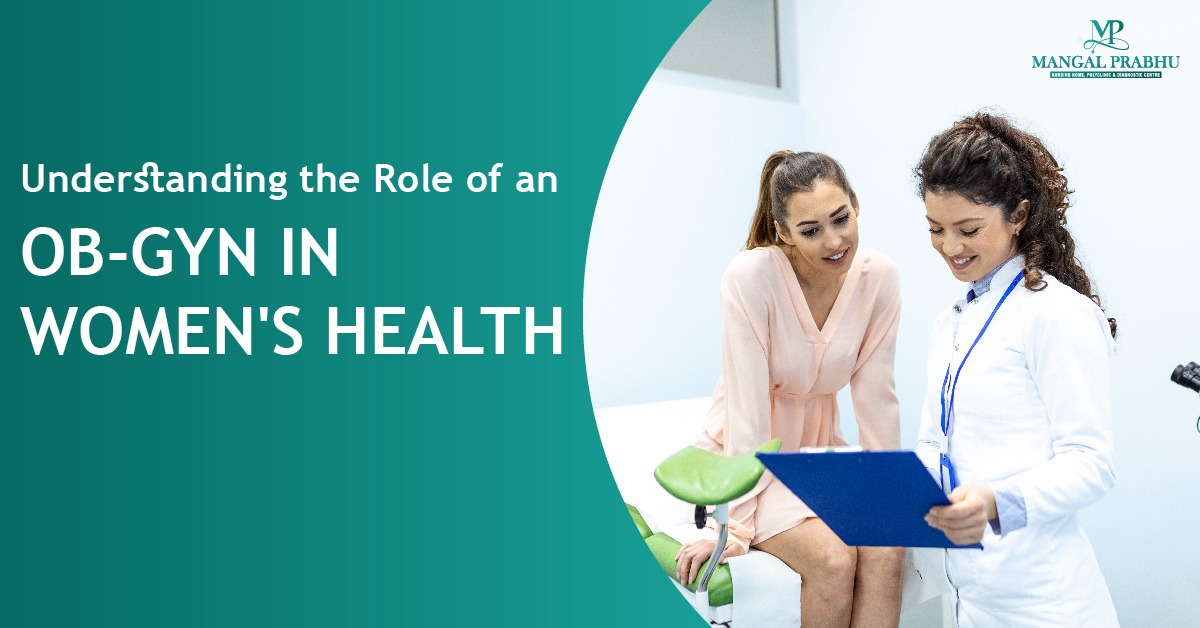
Understanding the Role of an OB-GYN in Women’s Health
Fertility and issues related to women’s reproductive health are increasing at an alarming rate these days. But, innovative treatments have encouraged people to seek treatment and get better faster and without undergoing invasive procedures. That’s what the gynecologist and obstetricians in Navi Mumbai aim to achieve.
The Role of an OB-GYN
An OB-GYN specializes in women’s reproductive health and is qualified to handle pregnancy, infertility, menstruation-related, and other health conditions in women. These professionals diagnose, treat, and manage mild to critical illnesses relevant to pregnancies, childbirth, post-partum care, and more. From diagnosing complex medical issues to suggesting the most suitable treatment based on your health, an OB-GYN does it all.
Reproductive Health
Women’s reproductive system is pretty complex and undergoes a lot of changes as she ages. Protecting your reproductive system from infections and other illnesses should be your top priority.
Your menstrual cycle starts in your teens (earlier in some women) and last till 40-50. Women might experience a host of issues in their menstrual cycle. Excess bleeding, painful periods, blood clots, lower back pain, and irregular periods are a few.
For fertility-related problems, you can discuss your issues with a gynecologist at the pregnancy hospital in Navi Mumbai.
Preventative Care
OB-GYNs are trained and certified surgeons that can perform diagnoses, and surgery, and offer preventive care. Here’s what they offer.
- Routine Gynecological Exams
- Breast Exams and Mammograms
- STI Screening and treatment
- Vaccinations
- Fertility treatment
- Pap smears
A gynecologist will ask about your medical history and medical conditions in your family to determine your risk for infertility and other issues.
Also Read: 10 Most Common Pregnancy Symptoms And How To Manage Them
Diagnosis and Treatment of Conditions
OB-GYN can treat a vast array of conditions—gynecology and urinary issues. From common women’s health issues to urinary incontinence and pelvic floor disorders, a gynecologist can treat most gynecology-related conditions and urinary issues effectively. Not just mild conditions, but OB-GYN can detect and treat cancer in your reproductive organs.
Pregnancy and Childbirth Care
From planning a pregnancy to postpartum care, pregnancy is one of the most challenging periods in a woman’s life. Working with a certified gynecologist will help you navigate this difficult time effectively and ensure a safe and smooth pregnancy. Here’s how an OB-GYN helps women during pregnancy.
- Screening and ultrasound in all trimesters
- Preparing you for the delivery
- Conducting cesarean if needed
- Postpartum care
Menopause Management
Menopause brings a wide range of symptoms, including hot flashes, heavy periods, irregular periods, abdominal pain, and other forms of discomfort. Managing these symptoms can get really hectic. Sometimes, your OB-GYN recommends hormone replacement therapy to bring your hormone levels down to normal.
In addition, they might recommend non-hormonal medication and lifestyle changes to manage your menopausal symptoms.
Working with an OB-GYN
Developing a healthy relationship with an OB-GYN is necessary for women diagnosed with infertility, PCOS, endometriosis, fibroids, and other reproductive health-related illnesses. You should communicate your goals with the gynecologist and seek their advice for all gynec-related issues. Whether you are planning a pregnancy or need treatment for menopausal symptoms, they can help.
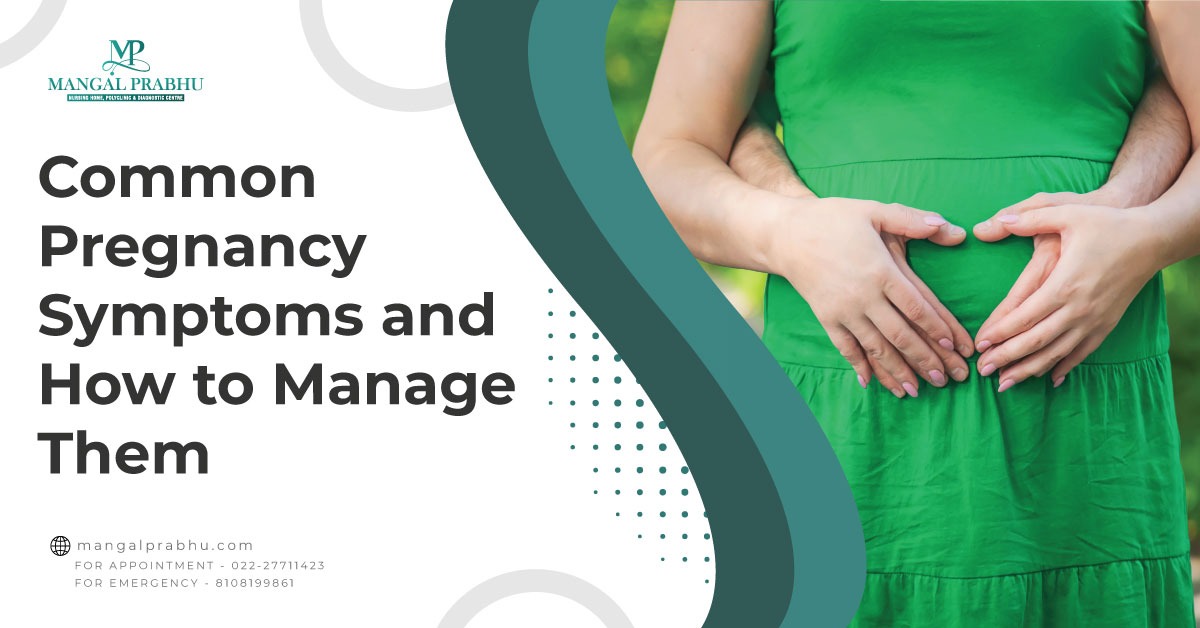
10 Most Common Pregnancy symptoms and how to manage them.
Pregnancy is an exciting time, but it can also come with a range of symptoms that can be uncomfortable or even painful. These symptoms can be caused by hormonal changes, changes in the body, and increased blood flow to the uterus.
According to one of the Gynaecologist in Navi Mumbai, here are some of the most common pregnancy symptoms and tips on how to manage them.
Most common pregnancy symptoms and tips on how to manage them:
1. Morning sickness:
Morning sickness is one of the most common symptoms of pregnancy. It usually occurs in the first trimester and can include nausea, vomiting, and fatigue. To manage morning sickness, it is important to eat small, frequent meals throughout the day, stay hydrated, and avoid foods that trigger nausea. Ginger and peppermint tea can also be helpful in easing nausea.
2. Fatigue:
Pregnancy can cause fatigue, especially in the first and third trimesters. To manage fatigue, it is important to prioritize rest and get plenty of sleep. Napping during the day and taking breaks when needed can also help.
3. Back Pain:
As the baby grows, it can put pressure on the lower back and cause pain. To manage back pain, it is important to maintain good posture, avoid standing or sitting for long periods of time, and use a pregnancy pillow for support when sleeping.
4. Constipation:
Hormonal changes during pregnancy can slow down digestion, leading to constipation. To manage constipation, it is important to drink plenty of water, eat fiber-rich foods, and stay physically active.
5. Swelling:
Pregnancy can cause swelling in the hands, feet, and legs. To manage swelling, it is important to stay hydrated, rest with your feet elevated, and wear comfortable supportive shoes.
Also Read: Breastfeeding And Your Sleep- How Do You Rest When The Baby Needs You All The Time?
6. Heartburn:
Hormonal changes during pregnancy can cause heartburn and acid reflux. To manage heartburn, it is important to eat smaller, more frequent meals, avoid spicy or acidic foods, and avoid lying down immediately after eating.
7. Mood swings:
Hormonal changes during pregnancy can cause mood swings and anxiety. To manage mood swings, it is important to practice self-care, prioritize rest and relaxation, and talk to a healthcare provider if symptoms persist.
8. Varicose veins:
Pregnancy can cause varicose veins, which are swollen veins in the legs. To manage varicose veins, it is important to stay physically active, avoid standing or sitting for long periods of time, and wear compression stockings.
9. Braxton Hicks contractions:
Braxton Hicks contractions are common in the third trimester and can feel like mild cramping or tightening of the uterus. To manage Braxton Hicks contractions, it is important to stay hydrated, rest when needed, and practice relaxation techniques like deep breathing.
10. Stretch marks:
As the baby grows, the skin can stretch and cause stretch marks. To manage stretch marks, it is important to stay hydrated, use a moisturizing lotion or oil, and wear clothing that is comfortable and not too tight.
Conclusion:
In conclusion, pregnancy can come with a range of symptoms that can be uncomfortable or even painful. However, with proper management and care, many of these symptoms can be minimized or eliminated. It is important to talk to a healthcare provider if you have any concerns or symptoms that persist.
A lot of people may be concerned with the expenses that come with healthcare needs, especially for pregnant women but there are centers now that are budget-friendly, an affordable pregnancy hospital in Navi Mumbai is known for efficient and advanced care with the moderate expense.
With the right care and support, pregnancy can be a happy and healthy experience for both you and your baby
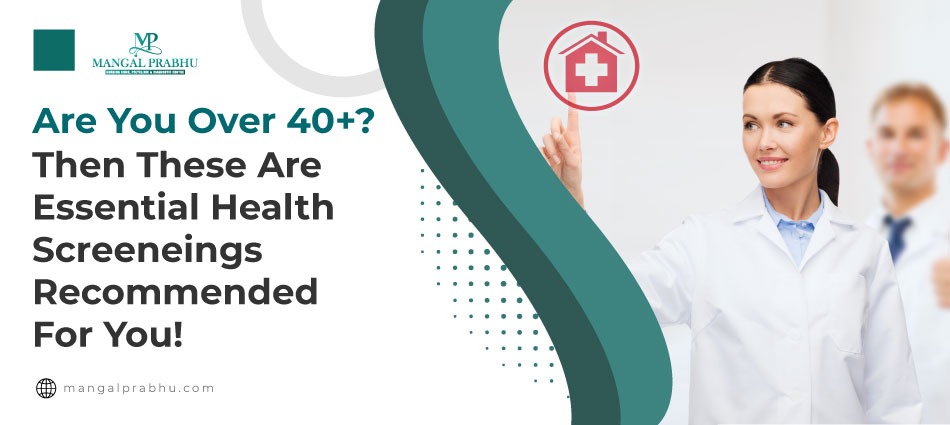
Essential Health Screening After 40
People around the age 40 have highly demanding jobs, responsibilities of elderly parents and growing children or all of the above, and therefore it’s easy to ignore health aside, though unintentionally. But 40 is the time to evaluate your overall wellbeing, and to plan for the long-run. It is considered a milestone when the risk of many health conditions increases. It could be due to lifestyle habits, negligent of health due to busy schedules and responsibilities, stress factors or hereditary. With today’s advance technology, most of the health issues are detectable and curable if treated at the right time. And the only way to stay on top of it is adopting measures such as lifestyle enhancement and regular medical check-ups and follow-ups.
Health Issues after 40.
Health screenings are generally an essential aspect of preventative health for people of all ages but as we grow older, regular check-ups for various factors must be considered as a priority. Health Care Providers in a Multispecialty Hospital in Navi Mumbai has shared the conditions they often spot in patients of this age.
- Overactive bladder.
- Perimenopausal Symptoms.
- Kidney stones.
- Urinary tract and prostate infections.
- Food allergies.
- Osteoarthritis.
- High blood pressure.
- Erectile dysfunction.
- Skin cancer.
- Depression.
- Anxiety.
Health Screenings for Men of 40.
- Prostate checks.
Prostate cancer spreads slowly, and early detection usually lead to successful treatment. The two main screening exams for prostate cancer are:
- Prostate-specific antigen (PSA test).
- Digital rectal exam (DRE).
- Colonoscopy.
Colorectal cancer (CRC) accounts for a lot of death and disease all over the world and is especially on the rise in the West. According to experts in the matter, if a polyps/tumours found on colonoscopy is small then they are easily removable, and the disease is stopped at that moment. It is highly recommended to begin CRC screening at an earlier age especially if there is a family history of CRC.
- Cholesterol Check.
Cholesterol tests should be a standard part of annual health check-ups, since cholesterol is seen as a biomarker of potential disease.
- Blood Sugar Test.
Blood sugar testing, and monitoring for good health, is highly advisable as it is one of the risk factors for metabolic syndrome. Blood sugar testing alone can alarm the health care providers that there may be a problem in the person’s health.
- Electrocardiograms (ECG).
The ECG reads the electrical impulses of the heart, and many cardiac abnormalities can be detected from these tests.
- Bone density tests.
Low bone density leading to hip fractures is a major medical problem. It is recommended that men with any of the above risk factors must consult their doctor for treatment and care.
- Dental check-ups.
Dental health is an important part of an adult’s overall health and wellness and being negligent towards it can pave the way for several other diseases.
- Eye Exams.
Eye exams can spot early signs of many chronic eye diseases, many of which do not have early symptoms.
Health Screenings for Women of 40.
1.Body mass index (BMI)/obesity screening.
Your weight and height are measured to calculate your BMI. The higher your BMI, the more chance you have of developing heart disease, high blood pressure, type 2 diabetes, certain cancers and other diseases.
2. Depression screening.
A test consisting of series of questions is administered to determine if you’re depressed or at risk for suicide.
3. Alcohol, smoking and substance misuse screening.
A test consisting of series of questions is administered to determine amounts and frequency of use.
4. Blood pressure check.
If you have history of blood pressure issues in your family, you should keep track of it by regular check. The goal is to have a blood pressure lower than 130/80 as an adult.
5. Cholesterol screening.
A cholesterol screening (also called a lipid panel) is a blood test that measures the amount of cholesterol and triglycerides in your blood.
6. Diabetes screening as part of a cardiovascular risk assessment.
It involves checking the glucose level in your blood while you are empty stomach. If your blood glucose level is too high, a retest is done to confirm a diabetes diagnosis.
7. Mammogram screening for breast cancer.
Women should begin mammogram tests (it’s an X-ray of the breast) at age 40 every year to stay on top of the matter.
8.Pap test screening for cervical cancer.
It is a test that looks for any abnormal cells on the cervix, as well as for HPV (human papillomavirus) infection.
9.Eye and dental exams.
You should have eye exams at least every two years if you’ve reached the age of 40. Schedule dental cleanings and exams every six months, and be diligent about following dental care regime.
10.Human immunodeficiency virus (HIV) screening.
HIV should be tested regardless of sexual activity, lifestyle, age or gender.
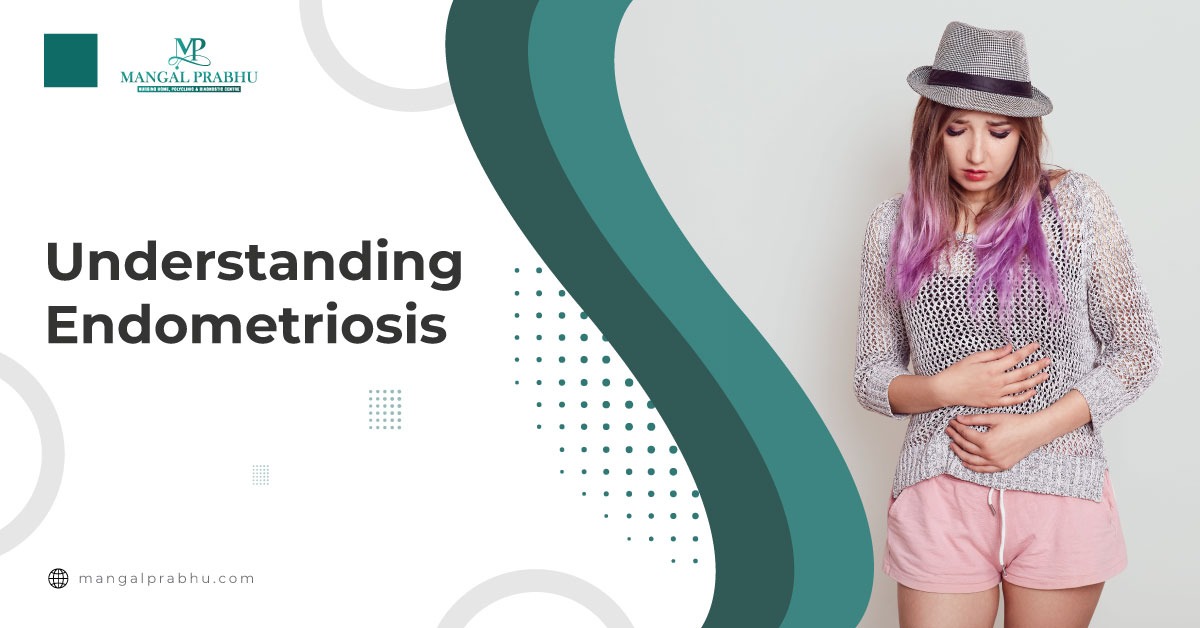
Understanding Endometriosis, Causes & complications
Understanding Endometriosis
Endometriosis is a painful medical condition in which the tissues forming the lining of your uterus grow outside the uterus, i.e. either within the pelvic area or outside that. It makes your periods painful and can also lead to fertility issues in women.
These tissues are called the endometrium. Between every menstrual cycle, these tissues grow surrounding the wall of your uterus and shed if you don’t conceive. The same endometrium-like tissues can grow in other parts of your body, including your abdomen and chest. If you notice the below-listed symptoms of endometriosis, contact a gynecologist in Juinagar, Navi Mumbai for treatment.
Causes and Symptoms of Endometriosis
The main cause of endometriosis is still unknown, but researchers believe there’s a genetic connection. If your mother, grandmother, or other females from your family have a history of endometriosis, talk to your gynecologist about your risk. People also link it to the defect in your ovaries, fallopian tubes, and other pelvic organs.
A common symptom of endometriosis is mild or severe pain in your lower abdomen or lower back. Some women may not experience any symptoms at all, which explains why endometriosis is often left undetected in most cases. Here’s what you might experience.
- Extreme pain in your abdomen
- Abdominal pain during or before periods
- Painful sexual intercourse
- Extreme bleeding
- Infertility
The symptoms may vary from one person to another. Some people might experience extreme pain, while others may have no pain at all (despite the severity of the condition). Some might also experience pain in bowel movements during periods.
Treatment for Endometriosis
Your gynecologist will ask about your future pregnancy plans, age, and the severity of the condition to determine the most suitable treatment for endometriosis. The doctor might prescribe pain medication to relieve your symptoms, although that isn’t a permanent cure for endometriosis. Or, they might recommend hormonal therapy.
The best treatment for endometriosis is laparoscopic myomectomy surgery in Navi Mumbai with medications. However, endometriosis is a chronic condition that might return a few years after the surgery. How soon it returns depends on the severity of the disease.
So, consult your healthcare provider about the risk of its recurrence. Myomectomy is suitable for people with pregnancy plans for the future. If you are not planning any pregnancy, you can get laparoscopic hysterectomy surgery in Navi Mumbai for complete relief.
Complications of Endometriosis
Endometrial tissues that grow outside your uterus can lead to adhesions and scar tissues. This can make your period pain worse over time. Some women with endometriosis might experience fertility issues. There’s a possibility that endometriosis might disappear over time and the lesions and scar tissues that formed due to the endometrial lining can get smaller. This mostly happens when the level of estrogen in your body drops.
It’s best to discuss your health goals with a healthcare provider and work with them to manage endometriosis and its symptoms. Although it’s not a medical emergency, the condition can cause unbearable pain and complications like your pelvic organs sticking to each other or scar tissue formation. These symptoms can get unmanageable.

Breastfeeding And Your Sleep- How Do You Rest When The Baby Needs You All The Time?
Breastfeeding is a beautiful thing. It’s hard work, yes, but it’s also incredibly rewarding. Breastfeeding can make you feel amazing and help your body in so many ways, but there may be times when you feel like you’re doing everything right and still not getting enough sleep. Here are some tips for finding restful sleep while breastfeeding:
Tips for getting more sleep by gynecologist in Navi Mumbai:
- Try to go to bed each night at the same time.
- Have a relaxing bedtime routine, including reading books or listening to music before going to sleep, taking deep breaths while lying down and focusing on your breathing, keeping your room dark, and making sure there are no distractions like electronics and/or pets nearby that could disrupt sleep, such as televisions or phones ringing. If you’re not comfortable with this step, then try using an alarm clock instead of relying on the sun rising so that you can sleep through the night without having any interruptions from outside noise sources like traffic noise, which may wake them up during nap periods when they need the most restful rest breaks after lunchtime meals!
- Avoid caffeine after 2 pm because this makes people feel wired later in the afternoon, which interferes with falling asleep easily.
Most importantly, rest when and how you can!
When you’re breastfeeding, it can be difficult to get enough sleep. Your baby needs you all the time! But if you are getting a good night’s rest and still feel like you have so much energy, then try some of these tips:
- Try to get some sleep when the baby sleeps. They usually fall asleep around 7 pm or 8 pm and wake up around 6 am or 7 am (usually earlier if they suckle more). This means that you’ll usually have about 2 hours before your next feeding is due – this gives time for naps as well!
- If possible, try not to take naps during your breastfeeding times because this will affect how long both parties have left in bed together before their next feeding session begins again, which could lead them into exhaustion mode faster than normal (but don’t worry too much about this one).
Everybody is different, but these tips may help you find the right solution for your needs.
If anything is bothering your sleep at night, talk to your doctor about it so that they can help diagnose the problem and make sure that there isn’t anything more serious going on in your eyes or balance system.
We hope you found these tips helpful! We know it’s not easy to find the right balance between rest and breastfeeding, but we all have to find our own way. Any prob
